Matt Rees's Blog - Posts Tagged "europe"
Review: The thriller that reminds us why Euro politics matter
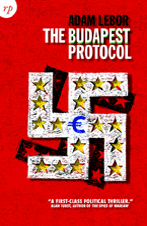
The Budapest Protocol, by Adam Lebor
(Reportage Press)
Sometimes a journalist comes across something so powerful that it seems bigger than the project he’s researching. Usually it’s put aside to serve as the basis for a future project, a magazine article or another nonfiction book.
Sometimes it takes such a grip on the writer’s imagination that there’s only one way to go. The novel. I know, because it’s how I turned from Middle East correspondent to the author of Palestinian crime fiction. Journalism seemed so limited by comparison, so unlikely to grab people and tell them “Pay attention, this really matters” the way a novel can.
That’s what happened to Adam Lebor in 1996 when he was researching his acclaimed “Hitler’s Secret Bankers: How Switzerland Profited from Nazi Genocide.” He stumbled upon a World War II intelligence dossier addressed to the US Secretary of State. It detailed a French agent’s report on German contingency plans for the economic takeover of Europe, should the Third Reich fail.
Lebor asked himself the question: what if the industrialists who intended to found this Fourth “economic” Reich had tried to do so, after the war? What if they had succeeded? (“What if,” as Stephen King notes in his “On Writing,” is the best place from which to start a thriller.)
From his vantage point as a correspondent based in Budapest, Lebor was able to see the massive inroads amounting more or less to takeover of post-Soviet economies by German and Austrian conglomerates. Add to that the growing centralization of the European Union and the introduction of its single currency forcing the economies of most of Europe to toe a single line, and you start to see why the Red House Report gripped him so.
The result is the chillingly real thriller “The Budapest Protocol,” published in the UK this month.
Alex Farkas, a local journalist, uncovers the economic conspiracy, which – as the novel unfolds – is focused on the election campaign of one of the conspirators as President of Europe (a post that many Brussels types would gladly see become reality). Farkas discovers plans for a new Holocaust against the Gypsies, which with the rise in these poor economic days of a neo-Nazi right-wing in Hungary is another of the novel’s moments of eerie realism.
What really drives Farkas, though, is the sinister murder of his grandfather, a survivor of the Budapest ghetto and a former dissident. That gives the novel the personal underpinning that elevates it above pure conspiracy theory. In fact, it makes it a first-rate thriller comparable to Robert Harris’s “Fatherland.” The novel reminds us that the politics of Europe remains more charged than the dull image the Brussels technocrats have lulled us into.
I’ll bet you’re sorry now you didn’t vote three weeks ago in the Euro elections. You will be after you read this novel.
Published on June 21, 2009 05:21
•
Tags:
budapest, crime, department, eastern, europe, fiction, futuristic, germany, hungary, jews, journalism, nonfiction, reviews, state, thrillers
Culture and harshness in Central Europe: Adam Lebor's Writing Life
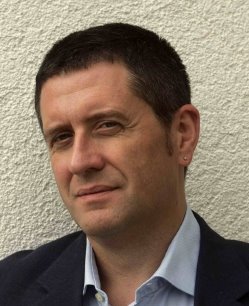
Political writing at its best highlights the unexpected changes in parts of our world that are hidden to us. That’s true of writing about the corridors of power in our own capital cities, but it’s even more of a factor for a writer like Adam Lebor whose work – fiction and nonfiction – has captured the dynamism and double-dealing of Central Europe, in particular. Because I live in the Middle East while he lives in Budapest, Lebor first came to my attention with his wonderful “biography” of Jaffa, the ancient port city on the Mediterranean coast, “City of Oranges: Arabs and Jews in Jaffa.” It was a masterful stroke to profile this town, rather than Jerusalem or even Tel Aviv, which tend to attract the attention of writers more readily than a historic city that’s now a slum filling with liberal yuppies. It shouldn’t have surprised me, then, that Lebor’s new novel The Budapest Protocol, which I reviewed recently, would take an issue that many think of as boring and bureaucratic – the expansion of the European Union – and make it immediate and vital, linking it to the demons of Europe’s past through Nazism and genocide. The novel is firmly in the tradition of great British writers like Eric Ambler, Graham Greene, and John LeCarre. Like them, Lebor knows that Central Europe’s cultured side comes with an accompanying harshness that makes for great drama.
How long did it take you to get published?
My first non-fiction book, ‘A Heart Turned East’, about Muslim minorities in Europe and the United States, was published in 1998 by Little, Brown, UK. It was commissioned so was published a few months after I wrote it. That was a fairly straightforward process. Since then I have written another five non-fiction books, all of which were commissioned.
Fiction, however, was a very different story. I first started writing the book that would become The Budapest Protocol in Paris in the winter of 1997. It was rejected by numerous publishers before I finally found one, Reportage Press, that would actually spend the time to tell me how to fix it. I always knew I needed the attention of a good editor, but apparently most publishers nowadays expect a perfectly formed novel to land on their desks, which is ridiculous.
Would you recommend any books on writing?
A search on amazon.co.uk for ‘writing a novel’ brings up 20,625 results. Most of the authors of these books are not well know novelists, because successful novelists are writing novels, not books about how to. That said, I have found ‘The First Five Pages’, by Noah Lukeman, very useful. Lukeman is a well-known American agent, and the book is full of good advice, from a commercial viewpoint. I would recommend it for anyone who is serious about getting published. I also like ‘Writing A Novel’ by John Osborne, which is enjoyably cantankerous but full of good advice.
What’s a typical writing day?
Breakfast with the Today programme on my Evoke internet radio, invaluable for keeping in touch when you live abroad - I am based in Budapest. Spend morning probably doing journalism or admin. Usually the muse arrives after lunch, and a good writing session will go from about 3pm to nine or ten at night. If it’s really flowing I will wake up in the morning with a plot solved or idea for a chapter plan that somehow my subconscious has sorted out while I am asleep and then I am straight back in the book.
Plug your latest book. What’s it about? Why’s it so great?
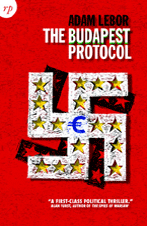
The Budapest Protocol is a conspiracy thriller that was inspired by a real American intelligence document from 1944. The document, known as the Red House Report, is an account of a secret meeting of Nazi industrialists in the Maison Rouge hotel, Strasbourg, where they planned for the Fourth Reich, which would be an economic imperium not a military one. That was the inspiration - I then used my twenty years reporting experience in eastern Europe to work out how that might actually happen. There is also a love story with several sexy, difficult girls and atmospheric scene setting in present day Budapest.
How much of what you do is formula dictated by the genre within which you write?
Thrillers are to some extent quite formulaic. The hero needs inner conflict to drive his outer battle with larger sinister forces. He needs to face and overcome repeated obstacles, each time getting in more and more danger. The trick is use the formula to make the structure work while making the setting, atmosphere and narrative drive powerful enough. Alan Furst, the master, gave me some advice: “Start with a murder and make sure the boy gets the girl” which was very useful.
What’s your favorite sentence in all literature, and why?
“Heshel was watching him through the window of the car and smiled thinly as their eyes met. Here is the world, said the smile, and here we are in it.” A line from my favorite book, Dark Star, by Alan Furst. Dark Star is an espionage thriller set in late 1930s Europe. That sentence is subtle, telling, and somehow opens a world of the imagination.
What’s the best descriptive image in all literature?
It was a bright cold day in April and the clocks were striking thirteen.
Who’s the greatest stylist currently writing?
Alan Furst. Less is more.
Who’s the greatest plotter currently writing?
David Ignatius, author of Body of Lies and The Increment. I would also add Stieg Larson, who sadly is not writing any more.
How much research is involved in each of your books?
The Budapest Protocol did not demand any specific research as I have covered this region for twenty years. My non-fiction books, like ‘City of Oranges: Arabs and Jews in Jaffa’ about Jewish and Arab families in the ancient port demanded many weeks of research, hours of interviews and gaining the trust of the families.
Where’d you get the idea for your main character?
The fact that he is a foreign correspondent, who lives in Budapest, who is obsessed with sinister conspiracies and who is entangled with beguiling but unsuitable women and whose first name is four letters beginning with ‘A’ is entirely coincidental.
What’s your experience with being translated?
Fine. I have been translated into eight languages, but I don’t really check what they have done to the book, even in languages I know.
Do you live entirely off your writing? How many books did you write before could make a living at it?
Now, yes. But that is combined with journalism for big papers like The Times, Economist etc. I think it would be very difficult just to live off books, and I like the change of pace with journalism. I value my connection with The Times, it opens doors and my assignments give me ideas for books and characters.
What’s the strangest thing that happened to you on a book tour?
I suppose it’s probably not that strange and happens to other authors but I was amazed that after two sell out events at the Edinburgh book festival with about 180 people in the room I only sold a handful of books. Why pay eight pounds to watch the author when you can buy the book for that?
What’s your weirdest idea for a book you’ll never get to publish?
I cannot reveal that as it’s such a good idea it may yet hit the shelves one day!
“Kill someone soon!” Dan Fesperman’s advice on The Writing Life
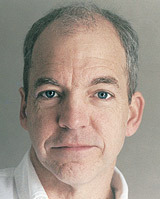
Journalists often dream of turning the more dramatic events to which they’ve been witness into fiction. Relatively few do so successfully, and certainly not with the panache of Dan Fesperman. He has stood out from the crowd of journalist-turned-thrillerists since his fabulous debut “Lie in the Dark.” It was based on his time reporting from Sarajevo during the Balkans War. It’s more informative than any history of that war, because it brings with it not merely dates and death tolls, but a much more important glimpse of what it’s like, emotionally, to live in a war zone. The graft that goes along with conflict tends to be ignored by historians, too, but for a crime writer it’s the most important element. “Lie in the Dark” won the Crime Writers Association John Creasey Dagger (not the last time the CWA awarded its first-novel prize to a former foreign correspondent reusing his experiences for fiction…. I won’t keep you guessing. I mean, me. Last year, for “The Bethlehem Murders” aka “The Collaborator of Bethlehem.”) Though it seems like a risky venture to ditch a journalistic career for something as financially iffy as writing fiction, Dan has made it work. He also notes that in these days of internet-fuelled media-industry carnage, he probably chose a more secure profession. I'm glad he did.
How long did it take you to get published?
Nearly forever. Or, in layman’s terms, almost two years after I finished my first manuscript. Just finding an agent took about a year and a half, mostly because a couple dozen told me to go take a hike, or, in the memorable words of one of the more callous rejections, “It is obvious from your letter and your submission that you know little about either querying or novel writing.” So maybe that’s why it seemed like forever, when, in the larger scheme of things, I suppose it didn’t really take that long. Or maybe it was that I waited until the age of forty-one to complete my first manuscript.
Would you recommend any books on writing?
Only Strunk and White’s Elements of Style, and within that slender volume only E.B. White’s brief but graceful essay on style. Anything beyond that and you’re only reading to avoid the looming confrontation with the keyboard.
What’s a typical writing day?
A typical ideal day, when things are going great and I’m deep into a manuscript, involves waking up with snatches of dialog already circulating like moths in the attic of my mind, followed by a quick cup of coffee consumed as I’m putting those thoughts to the page, followed by a solid three to four hours of writing, then maybe a bowl of popcorn for lunch, a few hours of re-writing, then a run and a shower, followed by several more hours of work until I look up at the clock and realize, “Oh, shit! If I don’t stop soon there won’t be any dinner on the table and it will be 7:30 and everyone in the family will be screaming for flesh, half-starved.” Followed by eight hours of sound sleep in which I dream about the characters in the book as they busily go about solving all of my pending plot problems. Which is partly my way of saying there is no typical day, only good ones and bad ones and ones in which, just when you’re thinking the day will be a total loss, you find yourself scribbling furiously in pursuit of some new thought that has just solved every problem you’ve encountered during the previous three weeks.
Plug your latest book. What’s it about? Why’s it so great?
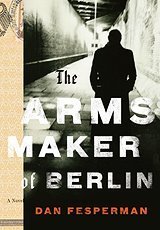 God, I’m terribly awkward about plugging my own books, but maybe for a moment I can channel the spirit of some wonderfully gabby PR person who has just shut the cover, and, hopefully, is totally enthralled by what she has just read. So, let’s see, it’s a literate, intelligent thrill ride down the deepest corridors of the 20th century’s darkest history – most of it occurring in Germany – spent in the company of a rather personable American male professor and a mysterious and fairly tormented young female historian from Berlin. Both of them are on the trails of the doings of an old spy and an old arms maker, whose deeds of purported heroism and venality may have actually been something else altogether, and may even now hold the key to further heroism and venality. Which is why several others folks want to keep our two historians from succeeding. In short, it’s still the same old story, the fight for love and glory, a case of do or die. And if I continue in this vein, I’ll violate copyright law (if I haven’t already), so I’ll stop.
God, I’m terribly awkward about plugging my own books, but maybe for a moment I can channel the spirit of some wonderfully gabby PR person who has just shut the cover, and, hopefully, is totally enthralled by what she has just read. So, let’s see, it’s a literate, intelligent thrill ride down the deepest corridors of the 20th century’s darkest history – most of it occurring in Germany – spent in the company of a rather personable American male professor and a mysterious and fairly tormented young female historian from Berlin. Both of them are on the trails of the doings of an old spy and an old arms maker, whose deeds of purported heroism and venality may have actually been something else altogether, and may even now hold the key to further heroism and venality. Which is why several others folks want to keep our two historians from succeeding. In short, it’s still the same old story, the fight for love and glory, a case of do or die. And if I continue in this vein, I’ll violate copyright law (if I haven’t already), so I’ll stop.How much of what you do is:
a) formula dictated by the genre within which you write?
b) formula you developed yourself and stuck with?
c) as close to complete originality as it’s possible to get each time?
I try at all costs not to write by any formula – either self-imposed or by genre – but from time to time I do find myself obeying a small voice in the back of my head that keeps saying things like, “Pacing, you idiot!”, or “If you don’t kill someone soon, then I’m going to jump out a window, and so will half your readers!” I haven’t yet discerned whether that voice is coming from one of my editors, who has somehow managed to install a sinister micro-command module in the room where I write, or whether it’s the same voice which, when I’m cooking, always yammers, “You know, this would taste a hell of a lot better if you’d just throw it in the deep-fryer.”
What’s your favorite sentence in all literature, and why?
“I was looking right into Anne’s face, and doing so, I knew, and knew that she knew, that this was the moment the great current of the summer had been steadily moving toward all the time.” That’s from Robert Penn Warren’s All the King’s Men, at the culmination of eight pages of sinuous sexual tension that has been building in a wonderfully lyrical account of a youthful summer romance. Basically, the book’s narrator is about to lose his virginity, and in this one sentence Warren captures all the sweetness and aching of youthful longing better than anything I’ve ever read. Even when I go back to it now I’m transported to one of those lonely summer nights when the whole world of experience seemed to lay just ahead, and every girl I cherished remained just beyond reach, yet there was also a palpable sense of potential, a realization that the era of fulfillment was nigh.
What’s the best descriptive image in all literature?
This is going to be much lengthier than what you probably had in mind with that question, but Thomas Flanagan wrote an outstanding historical novel. The Year of the French, about the 1798 “rising” in Ireland. Within it was perhaps the best summation by imagery of an entire nation that I’ve ever come across, and I’ll share it with you in slightly truncated form (am I again violating copyright law? Well, at least this time it’s for a selfless cause):
“We are a land of ruins. Norman keeps and towers, and the queer round towers of which no man knows their antiquity, shattered manor houses of the Tudor times, the roofless abbeys and monasteries savaged by the men of Cromwell, their broken arches gaunt arms against the tumbling clouds, strongholds of O’Neills and O’Donnells, Burkes and Fitzgeralds, bashed and battered away, moss and ivy creeping over their stumps as they lie dreaming beneath the great sky of Ireland… As though in this land all, everything, has been sentenced from the beginning to break apart, fall into pieces, powerless against our harsh divinities of rain and wind and weed and tall grasses. All in ruin, the ruin of a world, sacked and burned and smashed, by Danes and Normans and Irish and English.”
Who’s the greatest stylist currently writing?
I’ll say Jonathan Lethem, but I’ll say it with hesitation because he still has so many books yet to write, and to date has been a bit of a ventriloquist, channeling a lot of different voices (almost all of them wonderful to read, mind you). I also hesitate because most of my favorite stylists have either died – John Fowles comes to mind – or have wandered a bit from the path, such as LeCarre with his recent propensity to preach. I’ll also nominate a fellow who, with less timid editors, would perhaps be soaring in the grandest tradition of Southern baroque, and that would be Pat Conroy. But I’m guessing that due to his huge commercial popularity, his editors tend to cower and hold their blue pencils in abeyance, and as a result they often leave some of his more damaging excesses intact. Pare them away and you’ll discover a great deal of beauty, even for those who might find his work overly sentimental.
Who’s the greatest plotter currently writing?
Arturo Perez-Reverte comes to mind. So does J.K. Rowling (ducks). But for a single book it would be hard to top Ian Rankin’s performance in Black and Blue.
How much research is involved in each of your books?
As much as it takes. With The Arms Maker of Berlin, that meant a full month of looking through declassified OSS records in the National Archives, plus two weeks of traveling in Bern, Zurich, and Berlin. But I was cheating a bit, too, because I’d lived in Berlin for three years back in the mid-90s, and had done loads of news reporting on lots of the issues of guilt, shame, and complicity that come into play in the book. So I like to think I went into it fairly well armed with insight.
Where did you get the idea for your main character?
I needed a digger, a seek of larger truths, but I didn’t want him to be a journalist, and I also wanted him to be a fellow who from time to time let himself fall far to deeply into the wormholes of his work, and the occupation of historian was just about the only one that fit.
Do you have a pain from childhood that compels you to write? If not, what does?
No. No pain at all. In fact, I regret to say that my childhood was blissfully boring and uncomplicated, because I am well aware that all those writers who lived through sheer torment and Hell, and years of maladjusted angst in the aftermath, certainly seem to have a far easier time attracting huge advances and massive publicity. I personally blame my level-headed parents for this tawdry state of affairs, and firmly believe that the long-overlooked issue of the neglect of writers from well-adjusted childhoods should be explored immediately and at great length, beginning with, say, a guest appearance on Oprah, in which the cover of my latest book would be featured prominently amidst great praise.
What’s the best idea for marketing a book you can do yourself?
The one I just mentioned sounds about right.
What’s your experience with being translated?
Ten languages so far, but hit or miss from one book to the next. Rumanian is probably the biggest surprise to date, although I was also a bit shocked when someone from an Italian edition asked for permission to cut one fifth of the text. It was the one time in my life when I was glad I couldn’t speak Italian, because I said yes.
Do you live entirely off your writing? How many books did you write before could make a living at it?
Not really entirely, since my wife’s job provides our health insurance and a salary of its own. But, yes, I quit my day job as a newspaper reporter after the third book, The Warlord’s Son. At the time it seemed like a huge gamble, but given what has become of the newspaper industry it’s now apparent that remaining on the payroll of the Baltimore Sun would have been far riskier.
How many books did you write before you were published?
My debut novel was my first manuscript, thank goodness. One of the few benefits of being a late starter, I suppose.
What’s the strangest thing that happened to you on a book tour?
I had the misfortune of having a reading/signing slotted for the same night and time as the first presidential debate during the 2004 campaign, in a very politically savvy neck of the woods in northern California. Even the staff of the bookstore had the debate running on a TV in a back room. Heck, I wanted to watch it, too. About five people showed up, and I seem to recall that even one of them asked a political question.
What’s your weirdest idea for a book you’ll never get to publish?
A novel about the experiences of an Englishman swept up along with the Mongol hordes in the year 1226, an idea triggered by a throwaway line in a biography of Ghengis Khan which mentioned that, just before sacking Budapest, they sent an Englishman into the city to present their terms for surrender.



